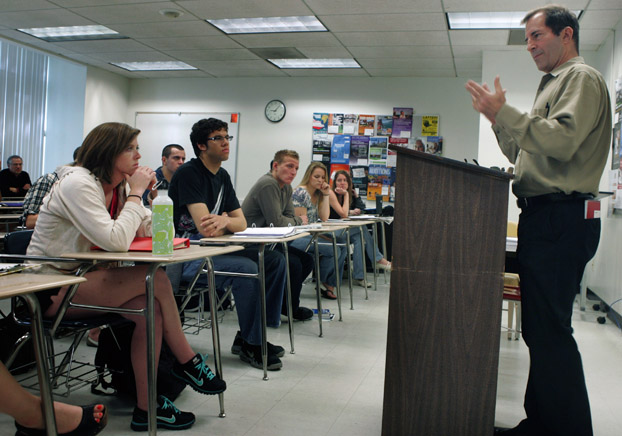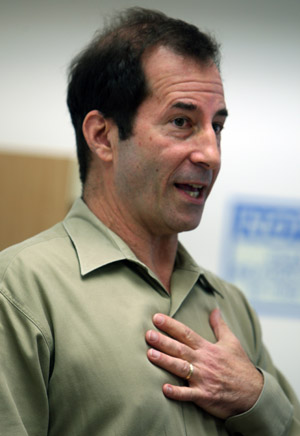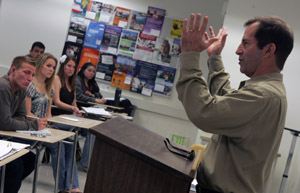 Caption: Los Angeles Times reporter Jeff Gottlieb tells Raphael J. Sonenshein's urban politics class how he and another reporter broke the story of alleged excessive salaries in Bell city government. Photo by Karen TapiaDownload Photo
Caption: Los Angeles Times reporter Jeff Gottlieb tells Raphael J. Sonenshein's urban politics class how he and another reporter broke the story of alleged excessive salaries in Bell city government. Photo by Karen TapiaDownload Photo
How Bell Broke
L.A. Times Reporter Tells Urban Politics Class Story of a Scandal
In their reports on the 2.5-square-mile city of Bell, Los Angeles Times reporters Jeff Gottlieb and Cal State Fullerton alumnus Ruben Vives revealed that city officials had allegedly bilked its residents of millions of dollars while paying themselves some of the highest salaries in the nation.
How they broke the story was the subject of a special March 15 lecture by Gottlieb in Raphael J. Sonenshein’s Urban Politics class at Cal State Fullerton.
Last summer, Gottlieb and Vives had been writing about the city of Maywood, another small Los Angeles County working-class community, and its plans to lay off all its employees, disband its police department and turn over municipal operations to a neighbor, when they learned about “high salaries” in Bell, Gottlieb explained.
 Caption: Jeff Gottlieb said he was shocked to find out how much the city manager of Bell got paid. Photo by Karen Tapia
Caption: Jeff Gottlieb said he was shocked to find out how much the city manager of Bell got paid. Photo by Karen Tapia
Gottlieb said he was asking the district attorney about Maywood investigations when he learned about Bell. He was told there was an investigation about high salaries. So, Gottlieb and Vives — who have since won a number of journalism awards for their Bell stories — went to the city in June, asking to speak to then-City Manager Robert Rizzo, who refused to see them. They asked the city clerk for the minutes of meetings and records about Bell’s expenses and contracts, and made a Public Records Act request for the material. The city clerk told them they would get the records in 10 days.
The scene didn’t sit well for Gottlieb, who years ago as a reporter for the San Jose Mercury News had uncovered a similar story in East Palo Alto’s Sanitary District. The district’s board and staff, he said, had been “spending all kinds of money taking trips across the country, staying in fancy hotels, eating at fancy restaurants…. So, I figured there has to be more going on in Bell than just these high salaries.”
What Gottlieb and Vives uncovered was the city’s alleged misappropriation of more than $5 million, salaries so high that they ignited community anger and calls for resignations. Most of the council members were earning nearly $100,000 for part-time work; far exceeding the $400-a-month stipend recommended for a city of its size, and a population of 40,000l. Los Angeles County District Attorney Steve Cooley has called the Bell scandal “corruption on steroids.”
Three days after Gottlieb’s talk on campus, six former Bell city council members pleaded not guilty to charges of misappropriating public funds. Separately, ex-City Administrator Robert Rizzo and his assistant, Angela Spaccia, were ordered to stand trial on charges of misappropriation of public funds related to more than $5 million in salaries and loans.
Listen and Learn
Hear an AUDIO EXCERPT from Gottlieb’s talk.
The following is a transcript by Casting Words of the excerpt:
Gottlieb: We’re hearing something’s wrong. We’re hearing that the city manager, this guy Rizzo, is making a lot of money. How much? We heard $300 grand, $400 grand, which is a lot for a city manager. Not so extraordinary. I think the average of a city manager in California is about two-ten, but there are some who get three hundred, so it's not that much.
Day 9, I get a phone call from the city clerk. She says, “We’re giving you the documents tomorrow, and Mr. Rizzo would like to meet with you.” I said, “Fine,” and I'm assuming we’re going to meet at City Hall, and City Hall is probably about the size of this building. I say, “Where?” and she says, “Little Bear Park.”
(Laughter)
Now, Little Bear Park is a place I bring my three year old to play on the swings. And so I had visions — when I go there, I’m going to literally meet with Rizzo on this park bench. OK, so fine. They wanted to meet us at the park, fine.
So, Ruben and I both, we go to the park, and it turns out, where we met is actually in this sort of meeting room where the Boy Scouts meet. It’s got a fireplace. And Rizzo has brought with him 10 people, a couple of lawyers, a couple of city council members, police chief, some other people. Obviously trying to intimidate us, which is pretty stupid because it’s very difficult, I think, to intimidate most reporters.
So the meeting starts, and we’re sitting sort of in a circle, and I’m here, Ruben’s next to me, and next to him is a stack of documents. And, they somehow expected us to start looking through these documents and asking questions; but, if I’m going to get the documents, why bother?
So, we start asking questions. After the first few, couple, of questions, finally, I turn to Rizzo and I say, “So, how much do you make?” And Rizzo coughs out, “$700,000,” which was such a high figure, I wasn’t sure I’d heard him correctly. I thought maybe he said $7,000 a month, or a week. I don’t know. I go, “How much?” He goes, “$700,000.” Ruben goes, “Jesus Christ!”
 Caption: CSUF students, like hundreds of thousands of Los Angeles Times readers, were enthralled with the story of Bell. Photo by Karen Tapia
Caption: CSUF students, like hundreds of thousands of Los Angeles Times readers, were enthralled with the story of Bell. Photo by Karen Tapia
(Laughter)
Then I turned to the police chief. And the police chief had been the police chief in Glendale, a much bigger city, had retired, a week later taken the job in Bell. I said, “how much do you make?” He says, “four-fifty–seven.” I said, “What did you make in Glendale?” He says, “two-fifty.” I turn to the assistant city manager, Angela Spaccia, and I say, “how much do you make?” And she says, “I don’t know.”
You know, everyone knows pretty much, what they make. “I don’t know.”
So, this meeting lasted for four hours. This was on a Friday. Meeting went on for four hours, and you could feel the tension go up and down. And, Rizzo and the city council members were utterly unrepentant. One of Rizzo’s quotes, and this is in a story that we wrote, was something like — talking about salary — “People may choke on that, but I can make more money in a private business.” I think the mayor said, “You get what you pay for.” And people were just, utterly unrepentant.
I had asked the council members — remember, who were getting paid a hundred grand a year. I said, “Do you make that much money in your regular job?” And, the mayor says, “Yes,” which was untrue. The other councilman, Luis Ortega, who’s a minister, he says, “No.” And I said, “Well, what did you think when you got that first paycheck?” He says, “I thought it was a gift from God.”
(Laughter)
I’m thinking to myself, “No, the gift from God is your quote, ’cause it’s going to go in the story.”
(Laughter)
So, this meeting goes on for four hours. And I say to Rizzo, “I bet you’re the highest-paid city manager in L.A. County,” and he goes, “I’m sure I am.”
So, Ruben and I walked out of this meeting. And I go, “I bet he’s the highest-paid city manager in California.“ We take a couple of steps. We go, “I bet he’s the highest-paid city manager in the country.” We’re both kind of shaking our heads. So this was a Friday.
Both of us happened to work Sunday. I was the night city editor that night, and Ruben was working as a reporter. And, there was another editor who we had mentioned it to, and she was like, “Oh my God! $700,000 a year.”
In fact, what we know now is, well, we have Rizzo's contracts. And, you sort of have to be able to do fifth-grade math to be able to actually figure out how much he made by the contracts. It would say he gets paid, say, 17 grand per bi-weekly pay. It didn’t say it was per pay period, which I found out was bi-weekly. Then, it would say, on so and so date, he gets a 5 percent raise, on so and so date, he gets a 12 percent raise. So you had to figure those things out. When I added it up, I came out with him making 787 and change, and so I say to Ruben, “Listen, you do the addition to determine what you come up with,” and he comes up with the same as I did.
So, I call Rizzo. I say, “So listen, I come up with 787 not 700. What’s the, you know, where am I making a mistake?” And he says, well, “I think you’re a little high, but that’s OK.” So I say to Ruben, “Tell you what. We’ll go with my figure, and if I’m wrong, I’m willing to write the correction that says, Bob Rizzo didn’t make 787, he only made 750.” OK.
And, what we now know is, there were people — we didn’t know any of this — who were sort of circling around for his salary. Someone from the community had filed a public records request, and Rizzo actually gave him a fake document, which said that Rizzo was making about 185 and the council members were making around 25. There was actually an L.A. Times reporter several years earlier who had asked for Rizzo’s salary and gotten a document that they made up that said he got 221.
We also know that there were several fake contracts he had. Had they given them to us, it would have faked us out. I’m not sure why we didn’t get that fake contract.
Now, when I asked in the public records request … by the Public Records Act, they are not required to create a document for you. So, I asked very specifically not what he made, I asked for his contracts; and so they gave us those. I’m still not sure why they didn’t give us … ‘cause they actually now know he had these fake contracts, which actually divided his salary up into what he was making as a city manager and on these various city boards, the sanitary board, the surplus property authority, things like that.
And he’s actually been … Rizzo, actually, today is his final preliminary hearing, he’s been charged with about, I think, 54 counts of corruption as have seven current and former public officials. And one of the things Rizzo’s charged with are these fake contracts. But, it’s not illegal to make too much money. That’s not illegal.
So, our meeting is on a Friday. So, we start on Monday working on the story. We’re trying to figure out different things about him. Is it, in fact, the highest salary in the country? It actually is impossible to find that out. The story appears on a Thursday with the headline — it was the lead story in the Times — and the headline was something like, “Is a City Manager Worth $800,000?” Very un-L.A. Times headline with a graph showing his salary going up looking like a stock market chart. All hell broke loose.
March 24, 2011
